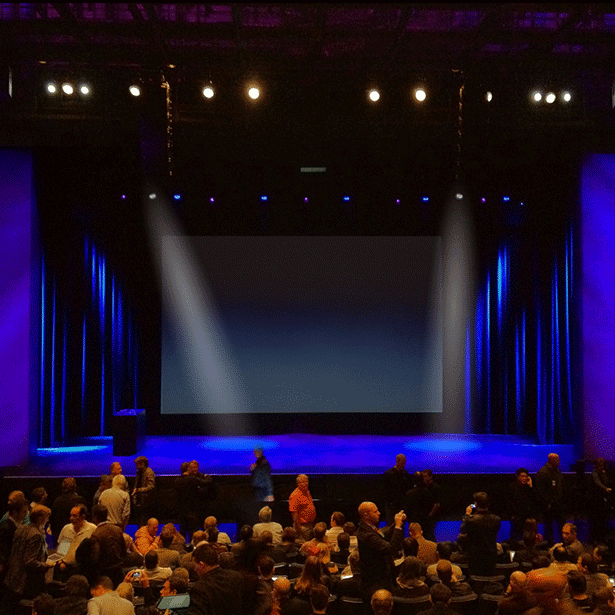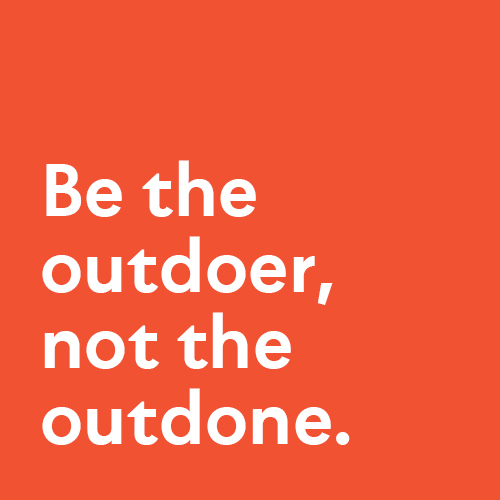You’ve been given the role of project manager for an upcoming event. Maybe you even have an idea for food and beverages, or who to hire for entertainment, and even have some fun activities in mind. But there’s something that is just as important: Event Marketing.
From hashtags to hospitality, your event marketing, all communications leading up to it, and how they tie into it can mean everything in terms of your event’s success. So, how do you put together a sound event marketing strategy?
Whether hosting, sponsoring, or presenting at an event as a first-timer or a seasoned pro, follow the steps in this simple guide to event marketing, and you’ll be armed with all the information you need to make the most out of any marketing event.
Four Reasons to Consider Event Marketing This Quarter
Don’t start daydreaming about the dessert table just yet. Before you get to that point there are a million and one details to consider. A large part of that planning process is determining the reason for the event; what you ultimately want to achieve and set event goals and KPIs (check out our blog on How to Measure Event Success).
Companies choose to participate in or host an event for a variety of reasons. Small companies may want the exposure that a live webinar can provide, while a larger company may need the face-to-face interaction that a tradeshow affords. Whether small or large, companies usually participate for one or more of four universally compelling reasons:
- Brand awareness
- Lead Generation
- Engagement with prospects and existing customers
- Education of attendees
In a recent BtoB Magazine survey, marketers were asked to name the goals of their event programs. The most common answers were lead generation (83%) and customer engagement (72%).
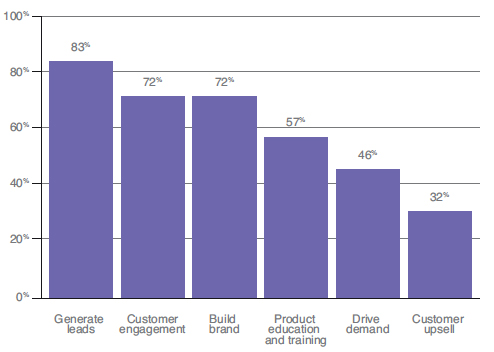
1. Brand Awareness
A key reason for a business to participate in an event is to establish and build its brand. Event marketing allows your company to cultivate and express its identity firsthand, and through organic, face-to-face communication.
Through events, you gain the perfect venue to share your ideas, thoughts, and name in the exact way that you want to present them. It is a venue that enables you to own versus rent the attention of your prospects and customers for a set time. People remember experiences, and an event is a perfect opportunity to showcase the personality and unique flavor of your brand in a way that is memorable and impactful.
2. Lead Generation
Another important reason businesses and brands choose to participate in an event is to generate leads. And what better way to do so than to host or participate in an event that is catering specifically to your target audience? The right events allow your company to interact with a group of prospects that already have an interest in who you are and what you do.
An event may not be the first communication with a prospective client, but it can be one of the most memorable and powerful. Using events to showcase your solutions is important, but couple that with a strong personal connection, a platform for conveying leadership and expertise, and maybe a snack or two, all in a fun, informative, interactive environment, and you have a recipe for a potentially rewarding relationship.

3. Engagement with Prospects and Existing Clients
Events offer an unparalleled level of engagement with your client, vendor, and partner relationships. They provide an opportunity to enhance and build on relationships by introducing them to products or services they may not know about or may not realize they need.
Even after the event, when properly planned and executed, they can generate a huge amount of buzz. In other words, you multiply the impact of your event by giving attendees a reason to share their experience with colleagues and peers after the fact. For ways on how you can capitalize on this social buzz, check out our blog for how to leverage social media trends.
4. Education of Attendees
Most people attend events for one of two main purposes: to network or to be educated. Both are powerful draws in their own ways. If an individual is attending for educational purposes, the information being presented is key.
No matter what type of event you are hosting, it’s critical to impart knowledge that the audience will value, and that sets your company apart. For example, by securing quality, high-profile speakers, you can draw a crowd. Or by sharing unique insights on topics that are relevant to the audience, you can advance your perception as a thought leader in the industry, and even establish a critical connection between your brand and prospective clients or partners.
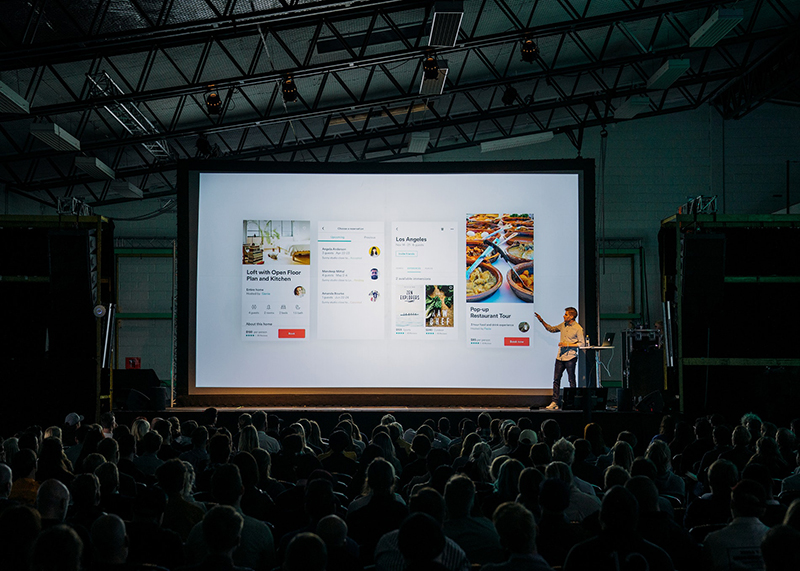
How to Plan a Successful Event Marketing Strategy
Now that you have a set reason and goals for your event, you remember those million details I mentioned previously? Well, now’s the time to dig into them.
There are many detailed aspects to planning and marketing a successful event – such as deciding on the target attendees; who will be staffing the event, including food and beverage, entertainment, wait staff, clean up, etc.; what the general theme or look and feel will be; if any promotions or giveaways will be provided and what they will look like, etc. – and before you get too overwhelmed, start by answering a few simple questions below and you can begin piecing together your strategic marketing event plan:
- What is the objective of this event?
- What type of event will best meet this objective?
- Who will you invite to the event?
- Prospects
- Customers
- Partners
- Press
- What is the proposed location of the event?
- What is the available time for this event (based on location availability) that will be convenient for your attendees?
- What is the look and feel of the event (theme and tone)?
- What is the format of the event?
- Presentation or Program
- Sit-Down Meal
- Cocktail Party
- What refreshments will be served?
- What activities, if any, will be provided?
Needless to say, there is a lot to keep track of when it comes to planning your event, let alone promoting it. A good place to start is to create a project schedule for your event.
Create a Project Schedule for Your Event
Whether you are participating in an event or hosting your own, you want to make sure that you have a firm schedule and a solid understanding of it. Because events have so many moving parts, a schedule is the staple resource that ensures that everyone knows all of the who, what, when, where, and whys of the event.
Your schedule should keep track of everything, including all promotion communication leading up to the event, timing for when food arrives during the event, changes in team member participation throughout the day, and all of the creating and producing of various event collateral and material in between.
Design the Event Look and Feel
So, you have a project schedule in place and have briefed your team on the basic rundown of the event strategy. Now it’s time to start the fun stuff – designing your event!
Designing and delivering a consistent look and feel in all of your event material helps to create a seamless, impactful brand experience. It is crucial that all event collateral stands out from the promotional noise and maintains a strong, cohesive design. Take the time to think about your theme, the set goals and KPIs for the event, and decide what you want your event to look like to promote and accomplish those goals.
An attention-grabbing design that supports your brand will help it stand out from all the competing noise, help tell a story, and give event attendees all the information they need. This design will influence all visual content for the event, and is a very important part of creating engagement across social channels before, during, and after the event, and is, in short, a cornerstone of your event strategy.

How to Promote Your Event
When you put so much time and energy into planning, designing, and producing your event, you want to make sure that you don’t slack when it comes time to promote it. You have to take the time to do it right.
You may want to consider a mix of email, social, public relations, and other types of paid promotions to generate the most attention, increase the rate of attendance, and get the biggest bang for your buck.
Start by communicating with your target audiences early and often leading up to the event. This will help to generate a better turnout as your event will be top of mind for your attendees. Similar to lead nurturing, successful event promotion consists of a series of touchpoints that might include press releases, emails, direct mail, and online & social media outlets.
Decide on an event marketing mix that will be effective in communicating to your audiences, determine the message that you want to send, and in addition to the event logistics (date, time, location), keep in mind some important details to include in your event marketing promotions.
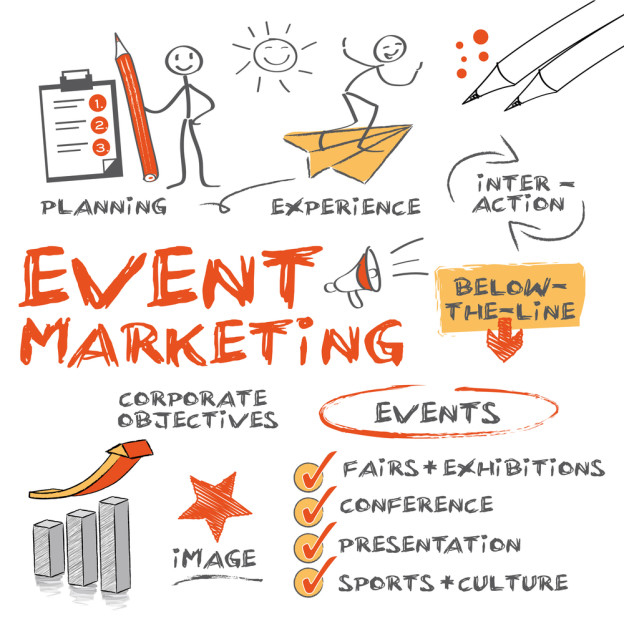
Important Details to Communicate
Including the following information will help to prevent unpleasant surprises for both your team as well as the event attendees:
- Event agenda and activities, if applicable: If you are planning to provide activities or host a program during your event, attendees will want to know the agenda ahead of time in order to plan their level of participation and make the most of the event.
- Food and drinks: This is a helpful courtesy that can have a powerful impact in couriering good favor with your attendees. In addition to the allure of the promise of refreshments, this will let people know whether they need to eat beforehand or bring food, especially if they have a food allergy.
- Dress attire: Make sure all participants know how to dress for your event. Business casual or flip-flop friendly?
- Weather: Outdoor events, transportation and even attire can depend heavily on this crucial detail. You likely won’t know this information until less than one week out, but it is important to plan for contingencies and keep your audiences in the know.
The Right Event Marketing Mix and Communication Tools
Now you know what to communicate, but knowing how to communicate effectively is much more important. Beyond merely announcing information, you should endeavor to engage attendees and get them involved in your event as soon and as much as possible.
Here is a checklist for you, from basic to advanced communication tools.
The Basics
- Event page on your website. This will help anyone who is interested in learning more about your event easily find updated information in one, central hub. Having an event landing page will provide you with a strong, consistent call-to-action and landing spot to point your audiences back to.
- Email marketing. Gather the emails of your desired attendees to build a strong outreach list. Make sure to build a strong campaign to introduce and confirm any event programs, activities, venue changes, or special guests that will take place all while featuring your event’s page on the official website to increase possible search engine optimization (SEO) opportunities.
- Direct mail. And I’m not just talking about the official invitations and save-the-dates. With the right planning, timely follow-up, and creative packaging, a direct mail piece can bridge the gap between online and offline engagement, and drive high response rates.
- Paid promotions. Paid promotions are an effective way to drive attendance, particularly to events that you host, large conferences, and large virtual events or webinars. Through paid promotions, you can expand your attendee list and get new names into your database.
- Banner and display – These types of ads appear on a website and can be effective at driving new names to register for and attend your event. You can either place your ads on sites that you think your target audiences frequent, or you can sign up for a retargeting campaign where your ads are targeted based on your audience’s internet preferences.
- Search engine marketing – People search for the events that they want to attend. Make sure you put ads on Google, Yahoo, and Bing to maximize your exposure. When someone searches for an event or a webinar having to do with your expertise, catch their attention with search ads.
- Sponsored newsletter and emails – By using sponsored emails, you have access to a target audience that might not otherwise be reached.
- Outdoor advertising – This is advertising that appears when someone is in transit, or at an activity outside of their home or office, in order to drive awareness or encourage a specific call-to-action. Billboards are a prime example of this, as are ads targeted to commuters on buses or in subways. These ads are also less targeted so they are best for brand awareness.
- Print advertising – From flyers to newspapers and magazine ads, print advertising includes all advertising found in printed media. Put an ad for your event in an industry-specific magazine or print fliers to give out at smaller networking events.

The Advanced
- Social media. Each social network serves as a different tool with a gauge for a unique audience. Weaving an image-rich, interactive story of what to expect, your event details and special features, guests, refreshments and themes can build solid engagement throughout your networks. Below are the primary channels to consider in promoting your event:
- Twitter – Regardless of whether it is a business event or not, Twitter is a good place to feature an up-to-date stream of what’s happening, ask for feedback, answer any questions, share interesting comments and more.
- Facebook – Consider this the “omnipresent network”, and it is a good, strike that, critical idea to set your event as public to promote more invitations throughout the Facebook community and better encourage shared comments, photos and videos.
- Instagram – It is a great place to share sneak peeks of the design, location, and anything evocative for your event. Be sure to promote your event hashtag here.
- Public relations. Great PR can help your company break through the noise that can sometimes dominate a busy event marketplace. Remember, you are often competing with many different companies for a share of the voice, and a PR strategy can help increase the decimal level of your own sound to get you heard by prospects, clients, as well as important media outlets.
- Guerilla marketing. This is a form of marketing that tries to generate brand awareness at a low cost by using atypical and creative methods such as graffiti, flash mobs, and poster campaigning.
Your event marketing communication style and social media presence can set the tone for your event before it begins. Find the best ways to share information with every one of your participants, and get people engaged and in attendance at your event. For expert tips on how to promote your event on Facebook, download our guide:
How to Drive a Successful Event Home
Well, you did it. You got the right people engaged at the right time with the right message, had an outstanding turnout, delicious food, vibing atmosphere, and an achieved an overall fantastic, successful event. Now you can breathe easy and the pressure’s off, right? Wrong! Event follow-up is as critical as the event itself.
Event Follow-Up
Timely and compelling event follow-up will set you apart from the competition and keep you fresh in the minds of your audiences. These communications, commonly called lead nurturing, is the process of building relationships with those qualified prospects that attended your event. But, be careful, it’s not about calling a lead every two weeks to see if he is ready to engage with you. Instead, it’s about sending timely and relevant messages to stay on their radar, while also providing your audience with information needed to make an informed decision when they are ready to engage.
Review Your Event Marketing Goals and Measure Results
Remember those goals you set way back when first planning your event? Now’s the time to dig them up and see how successful your event actually was. At least from a KPI/ROI perspective. When it comes to measuring those metrics, every company and every event will be unique in what they want to track. Depending on the goals you set for your event, to get a better idea of their success, check out our blog on How to Measure the Success of Your Event.
Conclusion
When done well, event marketing has the power to create a lasting and powerful positive impression. By allowing people to experience and interact with your company, product or service while participating in an event, you are not only connecting with potential buyers, but also reaffirming and promoting genuine, organic relationships with your clients, partners, and colleagues.
